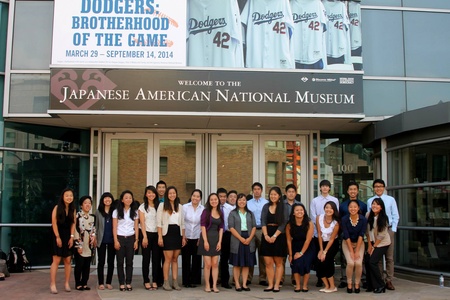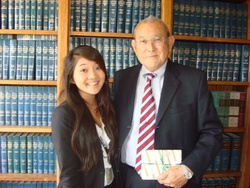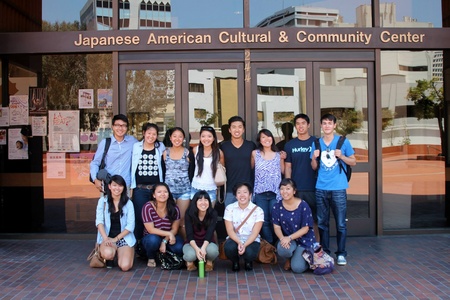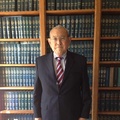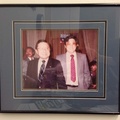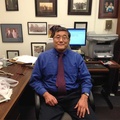It is incredible to imagine that there had been a staggering 43 Japantowns throughout the nation at one point in time. However, when Pearl Harbor was bombed and Executive Order 9066 was signed, the once populous Japanese American communities began to disappear.
Now, only three recognized Japantowns are left in the United States—Little Tokyo in Los Angeles, Nihonmachi in San Francisco, and Japantown in San Jose.
These remaining historic relics of the Japanese American community are spaces that physically capture the hopes of the immigrant generation, the injustices of the war period, and the progressivism of the Sansei in ways that cannot be recorded in a history book.
However, as Japanese Americans disperse across the country and corporate interests encroach on the area, these ethnic communities, along with the histories they embody, have slowly begun to fade.
With the goal of re-engaging Japanese American youth with the local Japanese American communities, the Nikkei Community Internship (NCI) is a state-wide program that places a cohort of interns in various community-based organizations across the 3 Japantowns.
Over the 8 weeks of the internship, I was placed with the Japanese American Bar Association (JABA) as well as the Japanese American National Museum (JANM), where I worked on collecting and preserving the histories of prominent Japanese American judges in the form of written profiles and video interview clips. And as a pre-law student majoring in history, I could not have asked for a more perfect placement that incorporates my interests in both history and law.
It was the greatest honor to interview Judge Tashima, the first Japanese American appointed to the U.S. Court of Appeals, and Judge Fujioka of the Los Angeles County Superior Court, as just an undergraduate student. And overall, these two interviews have fundamentally changed the way I think about what it means to be in the legal profession as a person of Japanese descent.
During Tashima’s interview, he shared with me how, “Japanese lawyers, all of them, had their offices in Little Tokyo, and all the Chinese lawyers had their office in Chinatown” when he was in law school in the late 1950s and early 1960s.
“Their practice was confined to the local ethnic community…because it was still a time of, at least in the business community, very overt racial discrimination,” he explained.
And even as a Harvard Law student, Tashima was also subject to the discriminatory hiring practices of that time. “I remember interviewing for jobs and nobody would hire me—none of the big firms,” he shared.
But Tashima, alongside many other pioneering Japanese Americans from the war period, proved to society that lawyers, judges, and “Americans” can and should look like us.
I think Judge Fujioka put it best when he said during our interview, “Americans couldn’t think that judges could look like me, lawyers that look like us, they couldn’t even think of Americans who looked like us.”
“But [the Nisei soldiers in WWII] proved and showed to others what Americans look like, and that’s profound because without them doing what they did, I couldn’t be what I am now,” he said.
Owing to these interviews, I have been left with a deep sense of appreciation for our Japanese American predecessors who have paved the way to allow future generations to fully participate in the legal profession.
On top of profiling the two judges, I was graciously allowed to shadow different professionals in the legal field, from Judge Holly Fujie of the Los Angeles Superior Court to Public Defender Susan Roe.
To be able to gain insight into the different niches of the legal profession as an undergraduate was truly invaluable in introducing me to what I can expect in the field of law.
In fact, one particular office visit that has remained with me is the half-day I spent with Mark Yoshida—the Senior Staff Attorney at Asian American Advancing Justice – LA. As part of Advancing Justice’s Immigration & Citizenship Project, Mark, alongside his team of attorneys, provide free legal services to immigrants looking to become naturalized citizens.
Seeing a lawyer like Mark use his law degree for the benefit of the community was an incredible example of how one can utilize a professional degree to affect positive change in our community.
Apart from my work with JANM and JABA, a cornerstone of my NCI experience was interacting with the impressive community of passionate and community-minded individuals in and near Little Tokyo.
Once a week, the Southern California NCI interns and I visited various community based organizations in Little Tokyo and the greater Southern California region that service the needs of Japanese Americans as well as preserve the distinct cultural identity of the area.
Incidentally, I worked across from the future site of Metro’s Regional Connector, which is slated to become one of the most busiest transit centers in Los Angeles and will radically transform the landscape of our community.
Though the construction of this new station will bring more visitors to Little Tokyo, it can also bring corporate interests into the area and as a result, threaten locally run businesses.
As I drove past the construction site every day, the corner of First Street and Central Avenue served as a reminder of how vulnerable all of the culture and history in the area is to the forces of gentrification.
Coming out of my NCI experience, I have indeed been left with a sense of ownership for the future of Little Tokyo—I patron local coffee shops rather than Starbucks, and I give mini walking tours of Little Tokyo’s historical monuments to my friends who come to the area to eat.
Though there were more than just three Japantowns at one point in time, I have come to see the importance in preserving the physical spaces where our predecessor’s once found a home during a time of harsh racial segregation and where our descendants will learn about their JA heritage. These are the spaces where the Issei generation first started their businesses and organized their community in an unforgiving society. Each store, temple, and community center preserves the stories of sacrifice and discrimination that I hope will be passed on for many generations to come.
*I would like to extend a huge thank you to Alex H. Fukui for organizing my weekly visits to various legal offices as well as providing me feedback and support for the two interviews I conducted. I would also like to thank Yoko Nishimura at the Japanese American National Museum for providing me a home at the museum as well as invaluable guidance throughout my eight weeks. To my fellow interns, let’s continue to keep supporting our JA communities! And of course, thank you Paul Matsushima, the Program Coordinator for Kizuna, for organizing this year’s amazing NCI program in Southern California. Last but not least, I would like to extend my gratitude to the CJACLC for continuing to sponsor this amazing program throughout its 13 years.
*This is one of the projects completed by The Nikkei Community Internship (NCI) Program intern each summer, which the Japanese American Bar Association and the Japanese American National Museum have co-hosted.
© 2014 Sakura Kato


